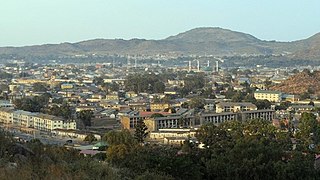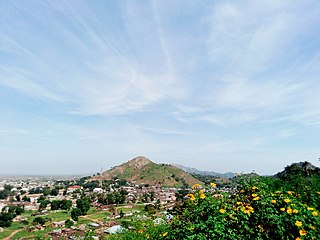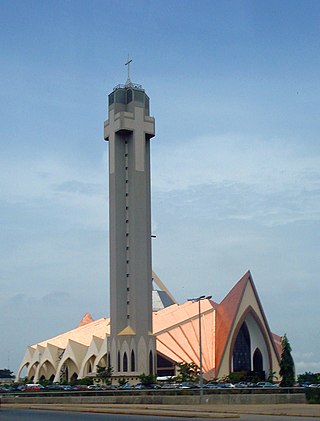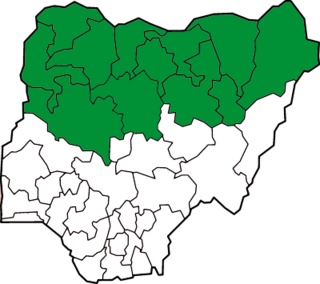
Abuja is the capital city of the Federal Republic of Nigeria, strategically situated at the geographic midpoint of the country within the Federal Capital Territory (FCT). As the seat of the Federal Government of Nigeria, it hosts key national institutions, landmarks, and buildings spread across its over 50 districts. It replaced Lagos, as the capital on 12 December 1991.

Owerri is the capital city of Imo State in Nigeria, set in the heart of Igboland. It is also the state's largest city, followed by Orlu, Okigwe and Ohaji/Egbema. Owerri consists of three Local Government Areas including Owerri Municipal, Owerri North and Owerri West, it has an estimated population of 1,401,873 as of 2016 and is approximately 100 square kilometres (40 sq mi) in area. Owerri is bordered by the Otamiri River to the east and the Nworie River to the south. The Owerri Slogan is Heartland. It is also called the Las Vegas of Africa, due to the night life of the city and the numerous hotels, casino and leisure parks all over the city.

Jos is a city in the North-Central region of Nigeria. The city has a population of about 900,000 residents based on the 2006 census. Popularly called "J-Town", it is the administrative capital and largest city of Plateau State. The city is situated on the Jos plateau which is lies within the Guinea Savannah of North-Central Nigeria. It connects most of the North-Eastern capitals to the Federal Capital Territory Abuja, by road. Driving in and out of Jos, traffic encounters very steep and windy bends and mountainous sceneries typical of the plateau, from which the state derives its name.

Plateau State is a north central Nigerian state. It is located near the centre of Nigeria and includes a range of hills surrounding the Jos Plateau. Plateau State is described as "The Home of Peace and Tourism". The state has a population of around 4.7 million people. Its capital city is Jos.

Maiduguri is the capital and the largest city of Borno State in north-eastern Nigeria, on the continent of Africa. The city sits along the seasonal Ngadda River which disappears into the Firki swamps in the areas around Lake Chad. Maiduguri was founded in 1907 as a military outpost by the British Empire during the colonial period. As of 2022, Maiduguri is estimated to have a population of approximately two million people, in the metropolitan area.

Aso Rock is a large outcrop of granitic rock located on the outskirts of Abuja, the capital of Nigeria. The Aso Rock is a 400-metre (1,300 ft) prominent monolith with a peak height of 936-metre (3,071 ft) above sea level. It is one of the city's most noticeable features. The Nigerian Presidential Complex, Nigerian National Assembly, and Nigerian Supreme Court are located around it. Much of the city extends to the south of the rock. "Aso" means victorious in the native language of the Asokoro ethnic group.

Chimaroke Nnamani is a Nigerian medical doctor and politician from Enugu State. He was elected Governor of Enugu State in the 1999 Enugu State gubernatorial election from 1999 to 2007. He subsequently served as a Peoples Democratic Party (PDP) Senator for Enugu East Senatorial District from 2007 to 2011 and was re-elected in 2019.

Christianity and Islam are the two main religions practiced in Nigeria. The country is home to some of the world's largest Christian and Muslim populations, simultaneously. Reliable recent statistics do not exist; however, Nigeria is divided roughly in half between Muslims, who live mostly in the northern region, and Christians, who live mostly in the southern region of the country. Indigenous religions, such as those native to the Igbo and Yoruba ethnicities, have been declining for decades and being replaced by Christianity and Islam. The Christian share of Nigeria's population is also now on the decline, due to a lower fertility rate relative to the Muslim population in the country.

The Voice of Nigeria or VON is the official international broadcasting station of Nigeria.

Zuma Rock is a large natural monolith, or inselberg, an igneous intrusion composed of gabbro and granodiorite, located in Madalla, a town in Niger State, Nigeria. It is situated in the west of Nigeria's capital, Abuja, along the main road from Abuja to Kaduna, off Madalla, and is sometimes referred to as the "Gateway to Abuja from Suleja". Zuma Rock rises approximately 300 metres (980 ft) above its surroundings. It was once thought to be in the Federal Capital Territory but is actually located at the upper end of Madalla, a rural settlement in Suleja Local Government Area of Niger State.

Igbo Jews are members of the Igbo people of Nigeria who practice Judaism. It is a tenet of their beliefs that they have ties to one of the lost tribes of Israel, the tribe of Gad.
Leadership is a Nigerian daily national newspaper. It was established in October 2004 by Sam Nda-Isaiah, a pharmacist cum businessman and politician, and is published by Leadership Newspaper Group based in Abuja, Nigeria. On its website, the paper asserts: "We shall stand up for good governance. We shall defend the interests of the Nigerian state even against its leaders and we shall raise our pen at all times in defence of what is right. These are the values by which we intend to be assessed".

A series of attacks occurred during Christmas Day church services in northern Nigeria on 25 December 2011. There were bomb blasts and shootings at churches in Madalla, Jos, Gadaka, and Damaturu. A total of 41 people were reported dead.
A series of assaults on businesses occurred in northeastern Nigeria on 5 and 6 January 2012, followed by attacks on police stations and government offices in the north on 20 January. Over 180 people were killed.
Timeline of the Boko Haram insurgency is the chronology of the Boko Haram insurgency, an ongoing armed conflict between Nigerian Islamist group Boko Haram and the Nigerian government. Boko Haram have carried out many attacks against the military, police and civilians since 2009, mostly in Nigeria. The low-intensity conflict is centred on Borno State. It peaked in the mid-2010s, when Boko Haram extended their insurgency into Cameroon, Chad and Niger.

Awo-Omamma, in the northeast of the Niger Delta basin, is an oil-rich indigenous Igbo town on the banks of Njaba River. It is a potential tourism hub in the region due to its species of wildlife in Umuezukwe and green vegetation.

Nnamdi Okwu Kanu is a British political activist known for advocating for the secession and independence of Biafra from Nigeria. He is the leader of the Indigenous People of Biafra (IPOB), which he founded in 2012. The main aim of IPOB is to restore the defunct Republic of Biafra which existed in Nigeria's Eastern Region during the Nigerian Civil War of 1967–1970.

The insurgency in Southeastern Nigeria is a military conflict that broke out in the city of Orlu, Imo State, Nigeria on 16 January 2021, when the Nigerian Army moved to crush the paramilitary wing of the Indigenous People of Biafra (IPOB), the Eastern Security Network (ESN). The conflict escalated after the ESN managed to repulse the initial push by the Nigerian Army, but IPOB ended the initial crisis by unilaterally withdrawing the ESN from Orlu. After a few weeks of quiet, Nigeria launched a military offensive in the area to destroy the ESN. On 19 February 2021, IPOB declared that as of the day before, a state of war existed between Nigeria and Biafra. Three weeks later, another separatist group declared the formation of a Biafran interim government which was subsequently endorsed by IPOB. Since then, the Biafran separatists have begun to form alliances with other separatist groups in Nigeria and Cameroon. Despite these developments, the separatists claimed that their militant operations were mainly aimed at defending local communities from armed herders and bandits instead of fighting the Nigerian government. In late June, IPOB leader Nnamdi Kanu was arrested by Interpol and handed over to Nigerian authorities.
On 5 June 2022, a mass shooting and bomb attack occurred at a Catholic church in the city of Owo in Ondo State, Nigeria. At least 40 people were killed, with the highest estimates being around 80. Some in the federal government of Nigeria suspect the Islamic State – West Africa Province of carrying out the massacre.















